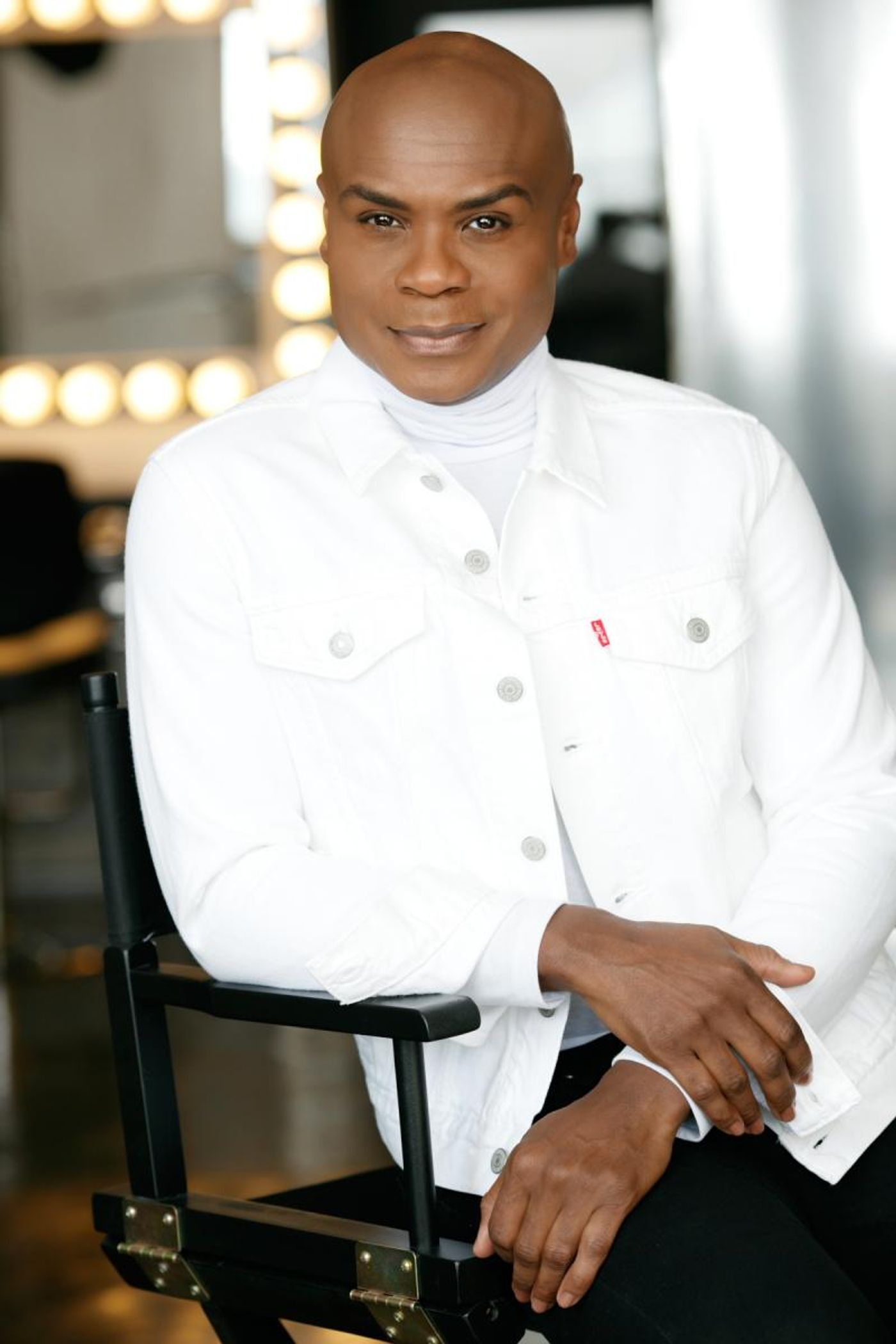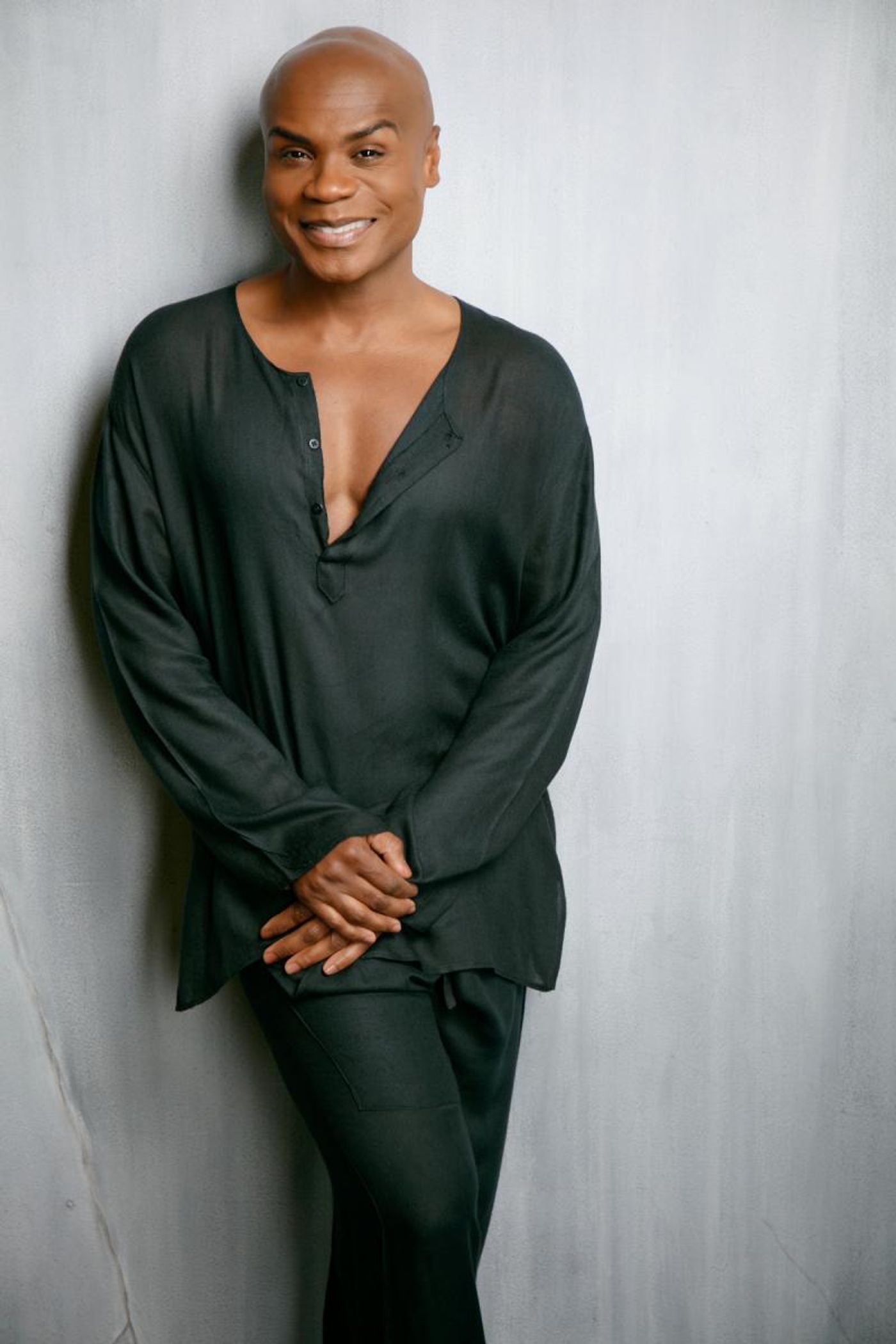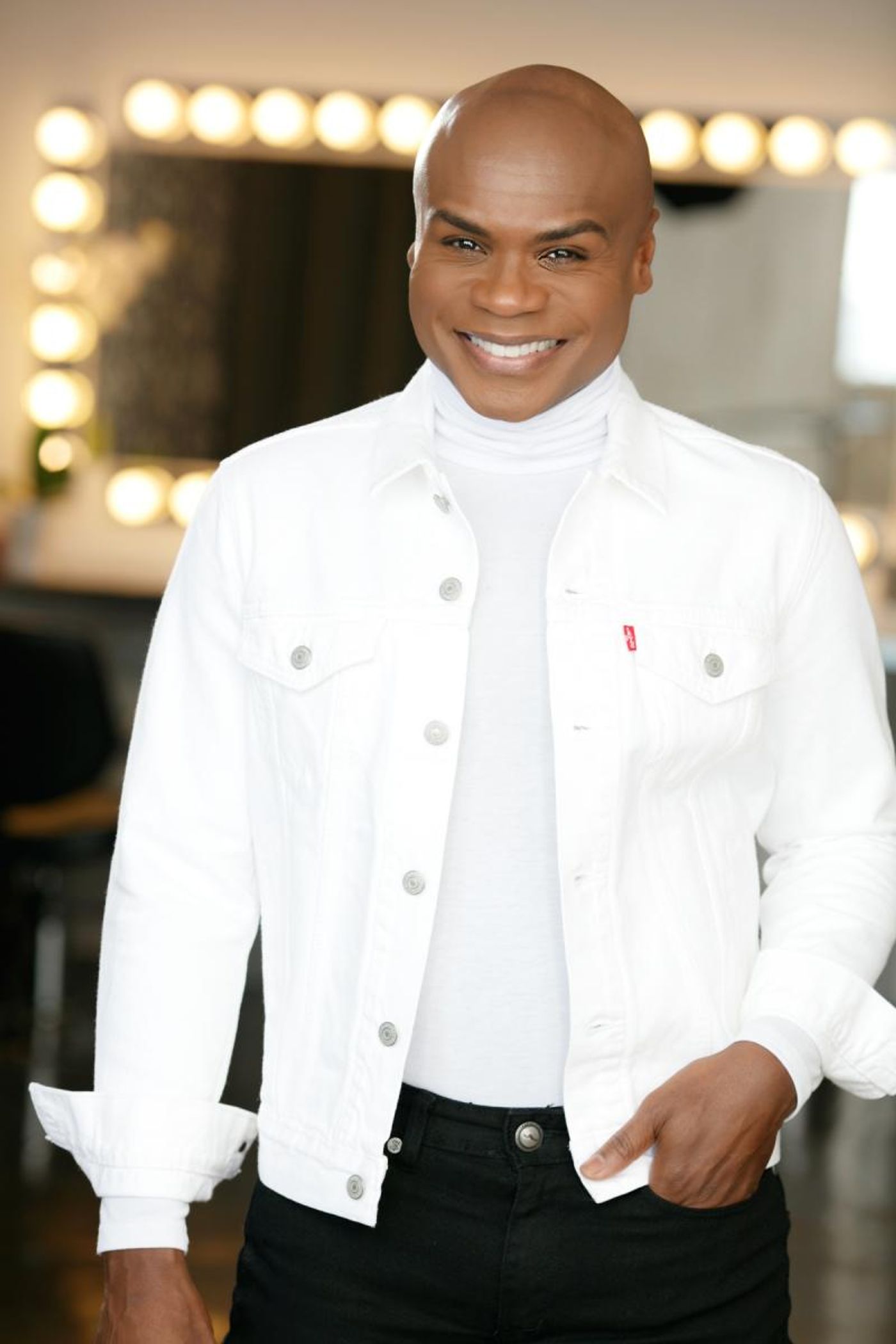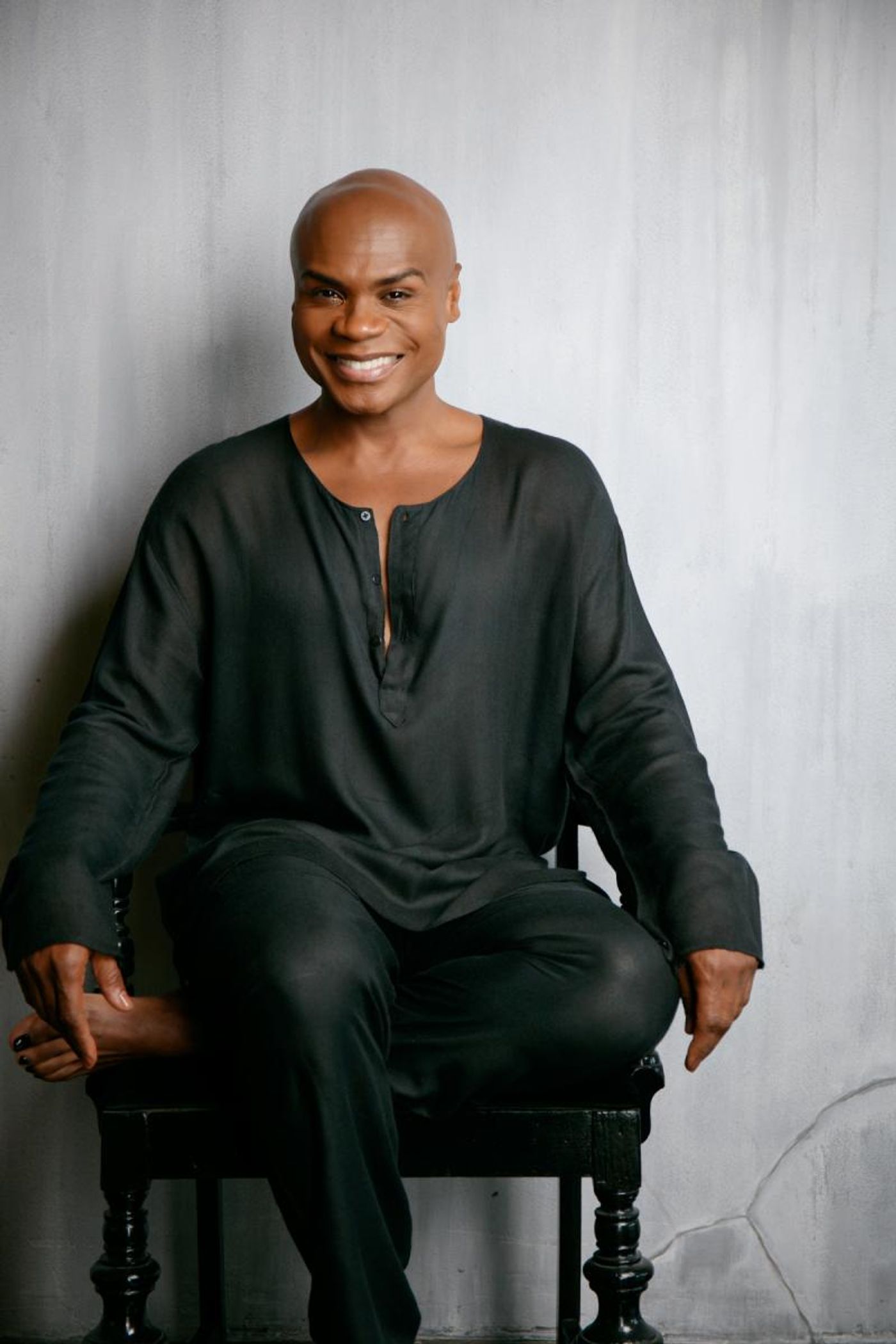Interview: Nathan Lee Graham Talks ALL THINGS BRIGHT AND BEAUTIFUL: A SONDHEIM SALON at The Green Room 42

Photo by Bradford Rogne.
The Grammy Award-winning Nathan Lee Graham returns to the cabaret setting with his newest show ALL THINGS BRIGHT AND BEAUTIFUL: A SONDHEIM SALON at The Green Room 42 on Thursday, October 11 at 7:00 pm. Recognized for his characters in Zoolander, HBO's "The Comeback," Broadway's PRISCILLA, and more, this world premiere concert will be his first evening of all theater music. Ranging from the dramatic ballads of FOLLIES to the comedic highlights of FORUM, Graham will perform many of the Pulitzer Prize-winning composer's most beloved compositions, including "Loving You," "Bounce," and "Being Alive." We sat down and chatted with Graham to get the inside scoop on the show.
You are making a triumphant return to the world of cabaret with ALL THINGS BRIGHT AND BEAUTIFUL: A SONDHEIM SALON at The Green Room 42. Tell me about this show.
The core of it is Sondheim's beautiful music, really. And, to its essence of being beautiful, I would even venture to say romantic - in a late 18th century, early 19th century kind of way. You know, when you see reality through an idealized way. When everything seems sort of idyllic, there's a hero, and you sort of see the world through rose colored glasses. It's imaginative, it's adventurous, it's very romantic in that kind of way. That is what I'm focusing on.
And, what I find so interesting about Sondheim's music in particular is that his characters may be idyllic, may have these sort of heroic intentions, but they are knowingly naive. They are completely aware of how impractical they are, and yet they still push the envelope because they want something. It's repeated sort of over and over again throughout so many of his pieces.
Also, Sondheim happens to be my favorite musical theater composer, and I've never done a musical theater cabaret show before. It's always been songs from the great American songbook. So, this is exciting for me.

Photo by Bradford Rogne.
So, where does this title come from?
Sondheim uses the phrase "bright and beautiful" quite often in several different shows. It sort of became a through-line for me. It's sort of like I'm Madame Armfeldt in A LITTLE NIGHT MUSIC in that I want some liaisons to happen because everything is so vulgar right now. And, so crass. I thought, "Why not escape for a few moments into this sort of world, and for someone who looks like me, Nathan Lee Graham, wouldn't it be an nice juxtaposition to have that happen?"
Often Sondheim is sung by white performers. There have been exceptions, naturally. But, I feel like in some ways you might be presenting a cabaret with some music that is being sung by someone who isn't white for the first time. Can you speak to that?
What's funny is that this music belongs to all of us, but we don't have an opportunity to always get to do it. So, it's interesting to me that he has always been my favorite musical theater composer and yet the irony is the likelihood of me doing a Sondheim musical is next to nothing, unless it is in some sort of revue or some sort of avant garde, daring casting. Now, mind you, I don't think it is daring in 2018 to be cast in a Sondheim show, but traditionally, as you've said, this has not been the case. And, I'm not complaining about that as much as awareness is key and times are a changing,
This music has always inspired me, and I just turned fifty on the ninth of September, so I'm in sort of this reflective place. I thought, "You know, it's time for me to do a musical theater show, and if I'm going to do one, I'm going to do my favorite composer. The one that I grew up with. The one that has taught me. The one who is sort of the standard bearer, the stalwart. The master, as far as I'm concerned, of musical theater." So, it just seemed a very natural bent for me to go there, and I tell you, the only reasons that I've worked in the ways that I've worked in all these years is because I never limited myself by what was already said you had to limit yourself by.
I believe that the music belongs to all of us, and the fact that I happen to be black, gay, and all the other derivatives, I know it means something to some people, but to me this is the music that appeals to me. This is the music that I am drawn to. My first cast album from the library that my father got me, and that's a whole other show, was A FUNNY THING HAPPENED ON THE WAY TO THE FORUM. This is the music that I became enthralled with first, and then all of the rest of them sort of fell out. And, it's funny because I like other musical theater composers, but, I keep coming back to Sondheim.
Composers shouldn't limit themselves to who they see doing their music. Musicians and singers shouldn't limit themselves to what they want to do out there. If I'm part of a small group of diverse people that does Sondheim music, then I'm happy to be a part of it, and let's continue that trend.

Photo by Bradford Rogne.
How did you make song selections from Sondheim's vast repertoire for ALL THINGS BRIGHT AND BEAUTIFUL?
I just picked up the music that most appealed to me and that most suits my voice as actor's music. That's what his music is to me too: actor's music. It's music that you are forced to, without forcing you to, really engage with. He uses language at the top. He is the poet laureate of the musical theater. But, at the same time, he's not speaking in Swahili. So, once you find out what the meanings of these words are, the double entendre, and what the rhyme is, then it's intriguing, and it's fun to investigate. Sometimes, you get it right away because the writing is great. All of that stuff is exciting, particularly for an actor who sings.
Then, if there was a Sondheimian tenor, let's say, that would be me. It just sort of suits my voice. It just sort of fits with how I think, what lens I look through. And, because music is universal, once it's done and put out into the universe, it belongs to all of us. You never know who you're going to touch. So, even though Sondheim himself may not have thought didley squat about me, his music touched me in so many ways. That's the most important thing. That's what art is supposed to do. If I can pick up a piece of art that's out there and then interpret it in my kind of way, then we all can relate to it.
As you've mentioned, Sondheim writes a lot of character to his songs, and the words he writes really matter. So, rehearsing his works is probably not your standard process. What have your rehearsals been like?
Well, there's a lot of alone time when you're learning a Sondheim piece. Once you have the notes, you can start living with them. Then, you really have to dive into those words and what they mean. The lyrics are just as important as the music itself, so it's imperative to get them right.
Since I am doing my own show, I'm allowed to stop. I'm allowed to go back and correct it, right in the moment [Laughs], with as much finesse as I possibly can. I'm not afraid to do that. I think that comes with age, and it also comes with experience. So, the process has been one of minutia and a lot of alone time because you have to go over these lyric methodically.
That means you have to sit down at a desk and really sort of get them out. Then it's a matter of walking around the streets of New York, on the subways, in taxis, at intermissions of shows that you're seated in the audience for, and the lyrics are literally going through your head constantly. I mean, it's just all the time, and you look like a crazy person. You're walking around the streets or you're going to Kodama to get a bento box and you're singing the lyrics to "Could I Leave You." It's just crazy, but day in and day out you're constantly thinking about them and then certain situations in life remind you of them.
Then, when you match those up with the music, and you marry those up with your musical director, that's when you start to freak out a little bit because everything you learned sort of goes out of your head because you get very excited by a blue note, a chord, or a dissonant note. You're so excited about it that it makes you go up. So, it's not the easiest process to learn his music, because it's really intense, particularly if you go into the meaning of what's happening.
As I'll mention in the show, singing about the truth is very dangerous, so if you go in you have to sort of be on your P's and Q's technique-wise to keep yourself together so you don't go up. But, at the same time, you have to go in deep enough that the audience can go along on this journey with you.

Photo by Bradford Rogne.
You're no stranger to cabaret. What advice would you offer to somebody who may be sitting down and thinking about doing their first cabaret?
Listen, you have to know what you want to do and what you want to convey. I'm not a cabaret artist that does lots of jokes and lots of patter. That's not my thing. My thing is the music. which I explain right at the top of every show. All of the people that I learned from - Bobby Short, Eartha Kitt - they sang most of the time. Then, you had witty sort of repartee patter between the numbers, but it always related to the numbers they were doing, that they were about to do, or had just done. It was never superfluous. Of course they could feed off the audience that night, but it always related back to the music at hand.
So, my advice to someone would be to find out who you are and what you want to convey in your show. If you're a person who is about a lot of patter and then some songs sprinkled about your show, that's completely fine. If you're a person that likes to do a whole story behind the whole reason for you doing the show, then that becomes your storybook and that makes your cabaret cohesive. I don't do a lot of therapy sessions in my shows. [Laughs] They're not cathartic in that kind of way. But, some people find that their shows are more of a therapy thing, like they're working something out and they wanted to express themselves in an artful way. I think that's all valid. I just think that you have to have something to say with your piece. My through lines and my themes for each show that I've done are primarily the music, so the music is all usually one composer, why that composer is important to me, and how it relates to me.
I certainly encourage people to be their total selves when developing a show, and to have a through line - to have a beginning, a middle, an end, and to really get to the heart of the matter. Do not waste so time. If you're going to have patter, make sure it's concise, and keep it moving. And, most importantly, choose the material that's going to best show off your talent at the end of the day. Also, you must love things that are live because the audience gives you things. I leave space open so that I can communicate and breathe with that last scene partner, which is the audience.
For tickets and more information, please click here.
Videos

